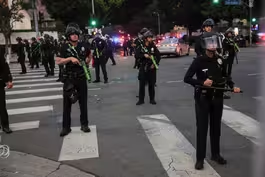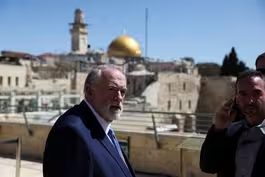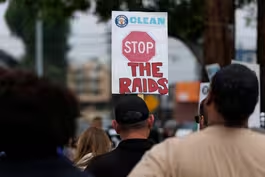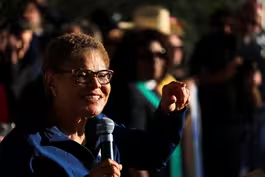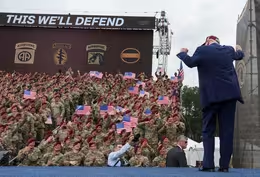
Community groups work to build trust to bridge divides
Clip: 6/11/2025 | 8m 57sVideo has Closed Captions
A look inside community groups working to build trust to bridge divides
Americans are increasingly divided, and many now see a breakdown in social trust as a key factor. In North Carolina, Judy Woodruff visited a project aimed at restoring that trust, part of a broader national effort to strengthen civic engagement. It's part of her series, America at a Crossroads.
Problems playing video? | Closed Captioning Feedback
Problems playing video? | Closed Captioning Feedback
Major corporate funding for the PBS News Hour is provided by BDO, BNSF, Consumer Cellular, American Cruise Lines, and Raymond James. Funding for the PBS NewsHour Weekend is provided by...

Community groups work to build trust to bridge divides
Clip: 6/11/2025 | 8m 57sVideo has Closed Captions
Americans are increasingly divided, and many now see a breakdown in social trust as a key factor. In North Carolina, Judy Woodruff visited a project aimed at restoring that trust, part of a broader national effort to strengthen civic engagement. It's part of her series, America at a Crossroads.
Problems playing video? | Closed Captioning Feedback
How to Watch PBS News Hour
PBS News Hour is available to stream on pbs.org and the free PBS App, available on iPhone, Apple TV, Android TV, Android smartphones, Amazon Fire TV, Amazon Fire Tablet, Roku, Samsung Smart TV, and Vizio.
Providing Support for PBS.org
Learn Moreabout PBS online sponsorshipGEOFF BENNETT: To North Carolina now, where Judy Woodruff visited a project aimed at restoring social trust, part of a broader national effort to boost civic engagement.
Judy's report is part of her ongoing series America at a Crossroads.
JUDY WOODRUFF: They gathered in a backyard in Raleigh on a recent Thursday night to play games, check in on their recent ups and downs and reflect on what it means to be a man, on emotions and on identity.
JORDAN BOWMAN, Executive Director, Journeymen Triangle: What is healthy masculinity?
I'd love to hear your unfiltered thoughts.
JUDY WOODRUFF: This is one of Journeymen's J-Groups that meets twice a month, part of their broader mission to create a circle of trust, to foster connection and character among young men.
TRISTAN NEAL, Journeymen Mentee: When I was 12, I was really angry a lot, easily frustrated and I would lash out.
It was a new experience to be in a circle of people and to be asked to talk about things that I never really talked about before.
JUDY WOODRUFF: Seventeen-year-old Tristan Neal joined Journeymen five years ago.
He says it has helped shape who he's become.
TRISTAN NEAL: There's the idea that to be a man you have to be stoic and strong and to not show what you're feeling.
And that really takes a toll on your mental health and your emotional health when you're sort of just bottling everything up and pretending like it's fine.
JUDY WOODRUFF: Founded in 2013, the nonprofit focuses on building strong relationships and trust between the boys and their mentors.
It also focuses on emotional development, teaching them how to express their feelings, and addressing some of the root causes of anti-social behavior and poor academic performance.
A key milestone is its annual Rites of Passage Adventure weekend.
JORDAN BOWMAN: We're teaching the young men to realize that they have impact, that their actions and words have impact on others.
JUDY WOODRUFF: For executive director Jordan Bowman, the message is simple.
JORDAN BOWMAN: You belong, you matter, your pain matters, and we can't take that from you, but we can teach you how to face it.
And as we teach you how to face it, it will become a gift.
JUDY WOODRUFF: He says he never received that message growing up until he went on a similar camp when he was 14.
JORDAN BOWMAN: I had experienced hard things growing up, but I never learned about how to turn that pain into a gift.
And it was really important for me to learn that.
And, as I did, I thought, how many other young people don't have this experience, that don't have a community to belong, to be connected to?
JUDY WOODRUFF: Recent research confirms that young men today are struggling.
One in four men under age 35 report feeling lonely, significantly higher than women the same age and the national average.
And that's one factor that studies have linked to an increased vulnerability to extremist ideologies.
JORDAN BOWMAN: Men and boys are experiencing social isolation more than their female counterparts.
Boys are dropping out of college more.
They're not in relationships.
They're not involved in the work force in the same way that they were 10, 15 years ago.
Male loneliness is like a phenomenon that I think more people are starting to understand now.
JUDY WOODRUFF: Two years ago as a high school freshman, 16-year-old Axel Cuba Arroyo joined Journeymen, but reluctantly.
AXEL CUBA ARROYO, Journeymen Mentee: Kind of down.
I was just like let me just go.
And then I started enjoying it, really connected with some of the people there.
JUDY WOODRUFF: That connection, he says, changed his direction.
AXEL CUBA ARROYO: Well, asking those deeper questions and then slowly peeling the onion and unraveling it, and we're able to have those connections and expand more on some other problems.
JUDY WOODRUFF: And making you somehow feel safe to bare yourself to people?
AXEL CUBA ARROYO: I would say definitely the tone and the setting of all of us being able to be there, I want you to trust me so I can help you.
JUDY WOODRUFF: The Journeymen program here in Raleigh is supported by a national organization called Weave: The Social Fabric Project.
It began seven years ago as a way of addressing the crisis of broken social trust that has contributed so heavily to our cultural and political divide.
DAVID BROOKS, Founder, Weave: The Social Fabric Project: Well, all the things I write about and all the things we talk about on the "News Hour," like political polarization, conflict, it occurred to me that a lot of the distemper of our times has roots not only in our politics, but underneath our politics within the social fabric.
JUDY WOODRUFF: Founded by New York Times columnist and PBS News commentator David Brooks, Weave supports local efforts that prioritize connection over division.
DAVID BROOKS: There are people in every neighborhood who are fixing the problem in their neighborhood.
And we call them weavers.
JUDY WOODRUFF: According to the Pew Research Center, fewer than half of Americans say they trust most of the people in their neighborhoods, a 15 percent drop from a decade ago.
Weave's goal?
Reverse that.
DAVID BROOKS: We thought, if we could get more people to think of themselves as weavers, that it was normal for me to be active in my community, normal for me to know that the people who live right around me, then that would have a big social effect.
JUDY WOODRUFF: These weavers are everywhere, says Brooks, and have been doing this sort of work all along.
FREDERICK RILEY, Executive Director, Weave: The Social Fabric Project: Most of them are saying, I don't know why I'm doing this.
I don't have anything that I have hacked into or there's no organization helping us.
JUDY WOODRUFF: Frederick Riley heads the Weave project at the Aspen Institute.
FREDERICK RILEY: What we have given them is something bigger to link their work to, but also using the stories of what they're doing to amplify other people to dig in deeper.
JUDY WOODRUFF: He and his team created the Social Trust Map, a digital tool using data to identify trusting behaviors, intentions, and spaces across the U.S. FREDERICK RILEY: We are in places that are tough neighborhoods.
We're in places that are rural that have been kind of like depleted, but we're also in suburban neighborhoods, like in Washington state.
It was important to us when we started this work to be -- to do work that actually was applicable to red and blue states.
And it's important because bringing those groups together is the only way we're going to build trust in this country.
JUDY WOODRUFF: There are now more than 10,000 weavers in this network, many of them people already doing the work quietly to build trust in their communities, from a supper club in Maine to a community garden in Baltimore and a group running beautification projects in Washington state that also helps bridge political divides.
DAVID BROOKS: Trust is hard to build because trust travels at the speed of relationships, and relationships take time to build.
But norms are built.
If you can shift how people think they should behave, then you can have vast social effects really fast.
JUDY WOODRUFF: For the Journeymen program, building that trust and the skills to navigate difficult conversations help bridge some of these divides.
Do you see a connection between what you're doing, what you have been doing with Journeymen has improved your understanding of other people, of differences between people?
TRISTAN NEAL: Yes.
No, for sure.
We have certainly had a few political conversations.
The ability to debate things like that, I keep going back to level-headed and maintaining calm.
And that's, I think, just such an important thing and to try and empathize and understand the other person, why they think what they think, where they're coming from.
Even for nonpolitical issues, I think in everyday life it's a great tool to have.
JUDY WOODRUFF: Journeymen now operates in four schools in the Raleigh area and hopes to expand further.
JORDAN BOWMAN: I mean, I wouldn't be where I was today unless I had people I could look up to and trust.
And it's what drives me.
It kind of feeds my fire is, like, I had this, and because I had this, I became a different person.
I kind of chose a different path.
It's our responsibility to do that.
We need to be showing up in the lives of young people.
JUDY WOODRUFF: For Tristan Neal, who graduates this month, the next step is to give back by becoming a mentor himself.
TRISTAN NEAL: I like to think anyway that I'm very centered and calm and I'm more capable of navigating conflict level-headedly.
I have the ability to support other people as I have been supported.
JUDY WOODRUFF: For the "PBS News Hour," I'm Judy Woodruff in Raleigh, North Carolina.
How GOP lawmakers are reacting to immigration raid protests
Video has Closed Captions
Clip: 6/11/2025 | 4m 10s | How GOP lawmakers are reacting to immigration raid protests and Trump's response (4m 10s)
Huckabee on Israel-Hamas war, humanitarian situation in Gaza
Video has Closed Captions
Clip: 6/11/2025 | 9m 37s | Mike Huckabee on the Israel-Hamas war and humanitarian situation in Gaza (9m 37s)
Immigration raid protests spread to more cities
Video has Closed Captions
Clip: 6/11/2025 | 7m 33s | Immigration raid protests spread to more cities as Trump threatens additional deployments (7m 33s)
LA mayor on military and National Guard presence
Video has Closed Captions
Clip: 6/11/2025 | 7m 1s | LA mayor says military, National Guard presence 'provoke the population' (7m 1s)
Trump blurs line between military and partisan politics
Video has Closed Captions
Clip: 6/11/2025 | 6m 27s | Trump's remarks at Fort Bragg blur line between military and partisan politics (6m 27s)
Providing Support for PBS.org
Learn Moreabout PBS online sponsorship
- News and Public Affairs

FRONTLINE is investigative journalism that questions, explains and changes our world.

- News and Public Affairs

Amanpour and Company features conversations with leaders and decision makers.












Support for PBS provided by:
Major corporate funding for the PBS News Hour is provided by BDO, BNSF, Consumer Cellular, American Cruise Lines, and Raymond James. Funding for the PBS NewsHour Weekend is provided by...
